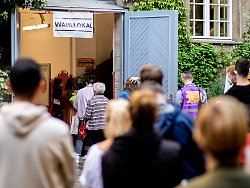Tuesday, October 5th, 2021
Three cases known so far
Chaos in Berlin: Minors vote for the Bundestag
The breakdown polonaise in Berlin has another new entry: As it becomes known, some minors not only vote for the district assembly, but also the House of Representatives and the Bundestag – without authorization. The error is homemade, there are warnings beforehand.
In Berlin, young people have apparently also cast their votes for the Bundestag and House of Representatives elections as well as the referendum. This is reported by the newspapers “Die Welt” and “Tagesspiegel” as well as “rbb24”. The general voting age is actually 18 years, but young people aged 16 and over and EU foreigners were also allowed to vote at the District Assembly (BVV).
The newspapers name three specific cases in the Neukölln and Pankow districts. A schoolgirl returned the incorrectly received ballot. The head of the district election office in Pankow, Mark Albrecht, spoke in the “Welt” of unfortunate individual cases. It is the youth’s own responsibility not to vote if they are given the ballot papers.
Wahl-Portal warned of manipulation possibilities
Already at the weekend the portal “wahlrecht.de” stated on Twitter that it had pointed out a “serious possibility of manipulation” to the Berlin state election control more than a week before the election. According to this, people between the ages of 16 and 17 as well as EU foreigners could use a trick to vote in the Bundestag election and the election to the House of Representatives, although they were only entitled to vote in the BVV.
Wahlrecht.de explains the process on Twitter as follows: Person A (German, of legal age) applies for the postal voting documents. Person A gives the ballot papers received to person B (16 or 17 years old or EU citizen), who has also requested postal voting. Person B is actually only entitled to vote for BVV and is only sent the voting slip for this in the postal voting documents. Thanks to person A, person B now has all the other voting papers, can fill them out and send them back in the envelope. In the end, person A does not vote by letter, but goes to the polling station on election day and receives all ballot papers again. Since all ballot papers are put in one envelope when voting by post, it is not possible to check whether the person who voted was also entitled to decide on all the votes. Berlin’s regional election control had decided that all documents would be sent back in one envelope when voting by post. The envelopes of the people who were only entitled to vote for the BVV were then thrown unopened into the same ballot box as the other envelopes, so they could not be filtered out.
According to “rbb24”, this procedure differs from the practice in other federal states. According to “Wahlrecht.de”, the state returning officer Petra Michaelis, who has since resigned, changed the rules for the counting shortly before the voting in order to exclude the possibility of manipulation. It is unclear whether that succeeded. In addition, according to “Wahlrecht.de”, Berlin had deviated from the federal election regulations when handling empty ballot envelopes: contrary to the requirements, these should not be counted as invalid votes.
Numerous problems in Berlin polling stations
There had been a number of mishaps in Berlin on election Sunday. In front of some of the 2,257 polling stations in the 78 constituencies, voters had to queue for a long time. A polling station was locked and had to be opened by the fire department. Elsewhere, ballot papers were missing in the meantime and had to be brought by messenger. That too led to delays. In some cases, votes could therefore only be cast after 6 p.m. In some places, voters received false ballot papers from other districts or constituencies that were later deemed invalid. The counting did not go smoothly everywhere, as election workers “rbb24” reported. By the middle of the week no results were available from several polling stations in the Charlottenburg-Wilmersdorf district; estimated figures were published on the Internet.
The Berlin Senate had announced that it would discuss the problems on election Sunday this Tuesday. A report from the internal administration is expected. The exact extent of the mishaps is still unclear, as is the question of whether they had any impact on the award of the mandate.
